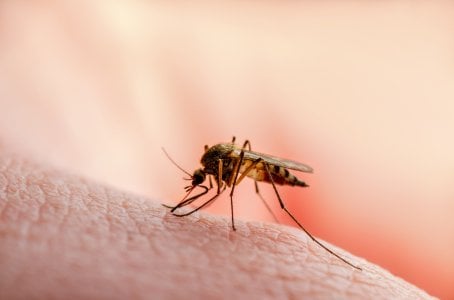State authorities issue health warning after deadly virus found in chickens and mosquitoes
By
Seia Ibanez
- Replies 6
A threat looms for locals and travellers alike in the picturesque Kimberley region of northern Western Australia.
Amidst the stunning landscapes and rich cultural heritage, a warning has been issued: mosquitoes in the area have been found carrying the potentially fatal Murray Valley encephalitis (MVE) virus.
The detection of MVE in both mosquitoes and sentinel chickens marks the first occurrence this year, according to WA Health.
This comes alongside a concerning increase in cases of the Ross River virus, another mosquito-borne illness, in the Kimberley region.

Dr Andrew Jardine, a managing scientist at WA Health, has linked this uptick to the significant rainfall the area has seen, creating the perfect breeding grounds for mosquitoes.
‘Ross River and Murray Valley encephalitis viruses are only spread by mosquitoes–so the message is simple: protect yourself from being bitten,’ Jardine said.
‘Many people are bitten when fishing or camping–make sure you pack an effective repellent and follow all the advice to avoid mosquito bites.’
‘While the risk of getting infected and becoming sick is low, the illness caused by the virus can be severe in some cases.’
To safeguard yourself and your loved ones from these mosquito-borne diseases, it's essential to take proactive measures.
 MVE is not to be taken lightly, as its symptoms can range from fever, drowsiness, and headache to stiff neck, nausea, and dizziness.
MVE is not to be taken lightly, as its symptoms can range from fever, drowsiness, and headache to stiff neck, nausea, and dizziness.
According to WA Health, there is no available vaccine or cure for MVE.
The Kimberley region is no stranger to this disease, with several cases reported last year, including two in children, one of which tragically resulted in death.
These incidents serve as a stark reminder of the importance of mosquito bite prevention.
For those planning to visit the Kimberley region or any area where mosquitoes are prevalent, it's wise to stay informed and prepared.
Visit the HealthyWA website to learn more about MVE, the Ross River virus, and how to protect yourself from these hidden dangers.

If you or someone you know begins to experience these symptoms, especially after a mosquito bite, it's crucial to seek medical advice immediately. If you’re in WA, you can look here for options.
Have you or someone you know been affected by a mosquito-borne disease? Share your experiences and tips for protection in the comments below.
Amidst the stunning landscapes and rich cultural heritage, a warning has been issued: mosquitoes in the area have been found carrying the potentially fatal Murray Valley encephalitis (MVE) virus.
The detection of MVE in both mosquitoes and sentinel chickens marks the first occurrence this year, according to WA Health.
This comes alongside a concerning increase in cases of the Ross River virus, another mosquito-borne illness, in the Kimberley region.

The Murray Valley encephalitis (MVE) virus was detected in the Kimberley region. Credit: Shutterstock
Dr Andrew Jardine, a managing scientist at WA Health, has linked this uptick to the significant rainfall the area has seen, creating the perfect breeding grounds for mosquitoes.
‘Ross River and Murray Valley encephalitis viruses are only spread by mosquitoes–so the message is simple: protect yourself from being bitten,’ Jardine said.
‘Many people are bitten when fishing or camping–make sure you pack an effective repellent and follow all the advice to avoid mosquito bites.’
‘While the risk of getting infected and becoming sick is low, the illness caused by the virus can be severe in some cases.’
To safeguard yourself and your loved ones from these mosquito-borne diseases, it's essential to take proactive measures.
Tip
Here are some practical tips to minimise the risk of mosquito bites:
- Time your outdoor activities carefully, avoiding the outdoors at dawn and early evening when mosquitoes are most active.
- Opt for long, loose-fitting, and light-coloured clothing that covers as much skin as possible.
- Protect infants and children with appropriate clothing, including socks and shoes, and use netting over beds and prams.
- Choose a personal mosquito repellent containing active ingredients like DEET, picaridin, or lemon eucalyptus (PMD) oil, and apply it thoroughly according to the product's instructions.
- Ensure your home, caravan, or any other accommodation has well-maintained insect screens.
- If you're sleeping outdoors, use mosquito nets and ensure your tent is mosquito-proof.
- Keep the vegetation around your home trimmed, as long grass can harbour mosquitoes.
According to WA Health, there is no available vaccine or cure for MVE.
The Kimberley region is no stranger to this disease, with several cases reported last year, including two in children, one of which tragically resulted in death.
These incidents serve as a stark reminder of the importance of mosquito bite prevention.
For those planning to visit the Kimberley region or any area where mosquitoes are prevalent, it's wise to stay informed and prepared.
Visit the HealthyWA website to learn more about MVE, the Ross River virus, and how to protect yourself from these hidden dangers.
Key Takeaways
- WA Health has detected Murray Valley encephalitis (MVE) in mosquitoes and sentinel chickens in the Kimberley region of northern Western Australia.
- There has also been an increase in Ross River virus cases in the area, both spread by mosquitoes.
- Locals and travellers are warned to take precautions to avoid mosquito bites, especially following substantial rainfall that has created ideal breeding conditions for mosquitoes.
- Preventative measures include wearing protective clothing, using effective repellents, maintaining fly screens, and reducing mosquito-breeding sites around the home.
Have you or someone you know been affected by a mosquito-borne disease? Share your experiences and tips for protection in the comments below.







